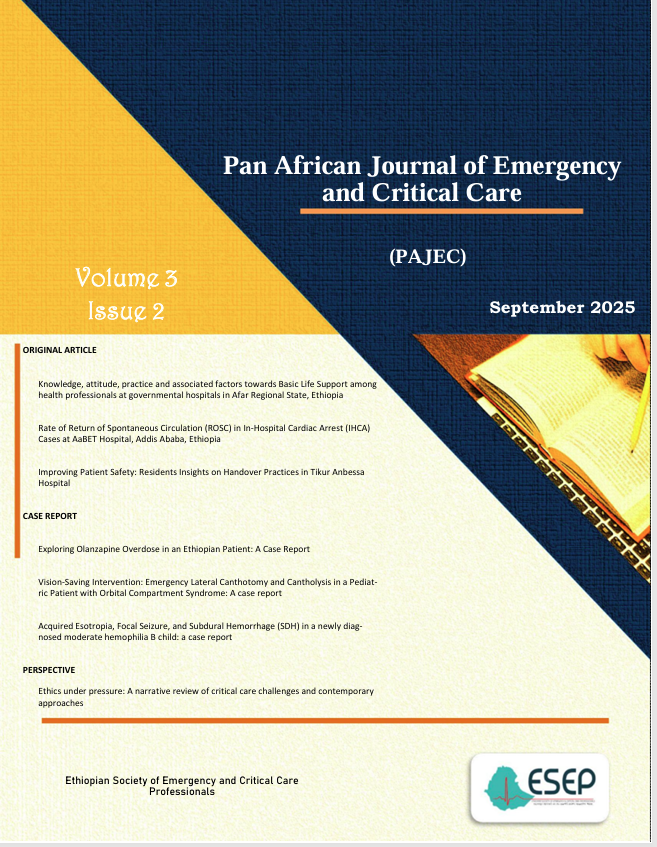Rate of Return of Spontaneous Circulation (ROSC) in In-Hospital Cardiac Arrest (IHCA) Cases at AaBET Hospital, Addis Ababa, Ethiopia
DOI:
https://doi.org/10.58904/2025/207Keywords:
Cardiac arrest, Cardiopulmonary resuscitation, Return of Spontaneous CirculationAbstract
Background: Cardiopulmonary resuscitation (CPR) is a life-saving procedure performed to restore the function of the heart and brain in individuals. In-hospital cardiac arrests (IHCA) are common, with 1–5 events occurring per 1000 hospital admissions, and are associated with significant morbidity and mortality. Studies investigating the rate of return of spontaneous circulation (ROSC) for in-hospital cardiac arrest (IHCA) patients have not yet been carried out in Ethiopia. Our study aimed to evaluate the ROSC rate at the AaBET Hospital Emergency and Intensive Care Unit (ICU) in Addis Ababa, Ethiopia.
Methods: A cross-sectional study using the Cardiopulmonary Resuscitation (CPR) documentation sheet at AaBET hospital with cardiac arrest at the ED and ICU was conducted from October 2019 to September 2021. The data analysis was conducted using the Statistical Package for the Social Sciences (SPSS) version 20. Descriptive statistics were computed to summarize and present the data in tables and figures.
Result: Out of the 68 cases analyzed, forty-five (66.2%) were male, and the mean age was 38.54, with an SD of 17.4. Fifty-five (80.9%) had trauma, and 33 (48.5%) had traumatic brain injury. Among the patients, 51.5% had a non-shockable rhythm, and twenty-two (32.4%) had asystole as the initial rhythm. Sixty-seven (98.5%) cases received adrenaline, while 24(35.3%) received fluid management. Only 8(11.8%) cases were shocked. Twenty-four had ROSC, which makes the ROSC rate 35.3 % with CI (24.7%-47.8%).
Conclusion: Cardiac arrest occurred more frequently in males. Trauma was the leading cause of arrest. Non-shockable rhythm is predominant in this IHCA study. Despite resource limitations, a ROSC rate of 35.3% was achieved, indicating the potential for improvement through structured protocols and training. Further national-level studies and a centralized IHCA registry are essential to improving cardiac arrest outcomes and post-resuscitation care in Ethiopia.
Downloads
Published
How to Cite
Issue
Section
License

This work is licensed under a Creative Commons Attribution-NonCommercial-NoDerivatives 4.0 International License.
This is an open access article distributed under the Creative Commons Attribution License, which permits unrestricted use, distribution, and reproduction in any medium, provided the original work is properly cited.


